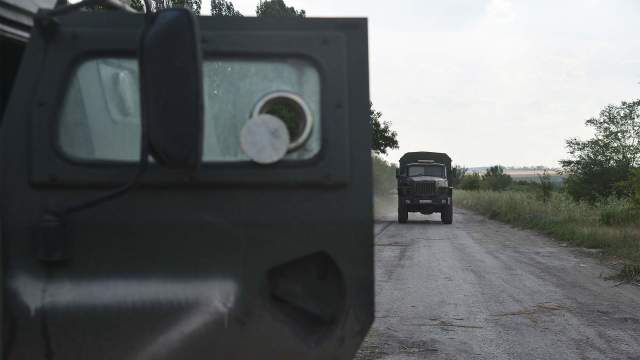Now the priorities of the forces of the Russian Federation and the people's republics have changed, military experts say
Over the past two weeks, 670 square kilometers of the territory of the LPR have been liberated, the head of the Russian Defense Ministry, Sergei Shoigu, said on Tuesday, July 5. According to him, the special military operation will continue until the tasks set by the Supreme Commander are fully completed. On the same day it became known that there was a replenishment in the Russian Guard. By decree of Russian President Vladimir Putin, the name "Guards" was assigned to the 80th Tank Regiment of the Central Military District. Meanwhile, experts note that after the liberation of Lisichansk, an operational pause began in this direction for the regrouping of troops and the preparation of the next major operation of the allied forces.
Military assistance
Over the past 10 days, 170 mercenaries have been destroyed, 99 refused to participate in hostilities and left the territory of Ukraine, Sergei Shoigu said at a conference call of the Ministry of Defense on July 5. The head of the department also said that foreign countries have delivered 28 thousand tons of military cargo to Ukraine by now. Some of them are already spreading across the Middle East region, as well as entering the black market.
According to the Ministry of Defense of the Russian Federation, the mine danger in the water area of the port of Mariupol has been completely eliminated. Engineering troops are clearing the territories of the Donetsk and Lugansk People's Republics of mines and explosive objects. More than 3.7 thousand hectares have already been tested. 46,379 explosive objects were found and neutralized.
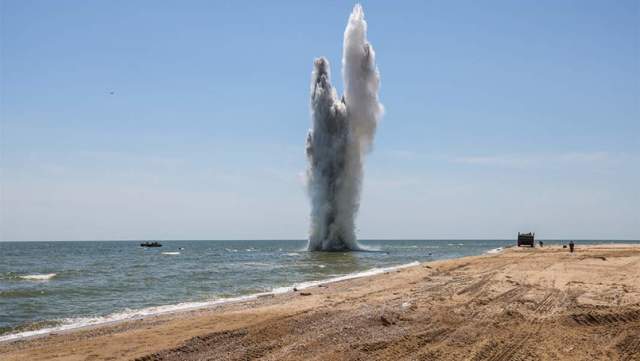
Photo: TASS/Vladimir Gerdo
Image source: iz.ru
On the same day, the 80th Tank Red Banner Regiment from the 90th Tank Division of the Central Military District was awarded the honorary name "Guards". The corresponding decree was signed by Russian President Vladimir Putin.
The document says that the name was given "for mass heroism and bravery, fortitude and courage shown by the regiment's personnel in combat operations to protect the Fatherland and state interests in armed conflicts."
The question of Kharkov
The months-long struggle for the urban agglomeration of Lisichansk, Severodonetsk and Rubezhny has tired the troops of both the LPR and the Russian Federation, military expert Vladislav Shurygin told Izvestia.
— It is no coincidence that President Putin announced the need for rest for them the day before. In addition, during the retreat from Lisichansk, the VFU actively mined roads and terrain with anti-tank and anti-personnel mines. The remote setting of barriers, including dangerous anti—personnel "petals", was widely used for this purpose," the expert noted. — Mine clearance will also take several days. Taking advantage of this brief respite, the enemy will now try to organize a defense at the Seversk – Artemovsk line, because the front line has now become shorter, straighter and does not form new potential boilers. But the level of disorganization after the defeat is unlikely to allow them to hold out here for a long time, and the VFU will roll back to Slavyansk.
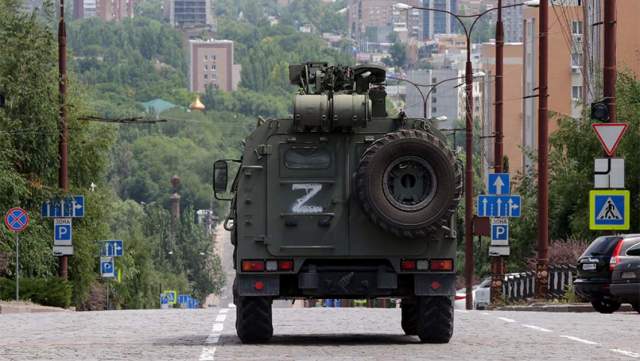
Photo: TASS/Egor Aleev
Image source: iz.ru
According to the expert, now the Allied forces have changed priorities, and the next large-scale battles will be the battles for the Slavyansk-Kramatorsk agglomeration and the defeat of Ukrainian forces near Donetsk.
— The Allied group will have to complete the liberation of the entire territory of the Donetsk People's Republic and secure it and Russia from shelling, — said Vladislav Shurygin. — It is already clear that it will not be limited to the former administrative borders of the regions alone. As long as Ukrainians have the physical opportunity to get Donetsk, Lugansk, Belgorod with artillery and missiles, they will not calm down. It is necessary to deprive them of this opportunity. Inevitably, the question of Kharkov will arise.
Chemical hazard
Colonel-General Mikhail Mizintsev, head of the National Defense Control Center of the Russian Federation, warned about a new provocation by the Kiev authorities with the use of toxic substances on July 5.
According to him, in Nikolaevka of the Donetsk People's Republic, militants of nationalist formations brought containers with liquid chlorine (over 6 thousand liters) to the pumping and filtration station of the Slavyanskaya TPP and mined them. They plan to undermine them when Russian troops and formations of the Donetsk People's Republic approach.
In addition, Ukrainian armed formations, using chemical industry facilities to deploy units and military equipment, deliberately create prerequisites for the occurrence of man-made accidents, as a result of which thousands of civilians may suffer, Colonel-General Mikhail Mizintsev said.
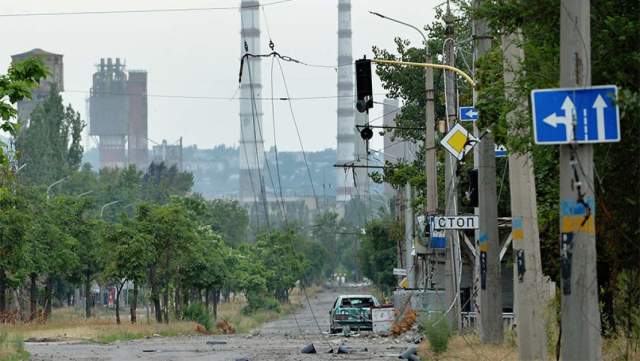
Photo: RIA Novosti/Viktor Antonyuk
Image source: iz.ru
According to the Ministry of Defense of the Russian Federation, in Nikolaev on the territory of the enterprise "Ukrhimtransammiak" (ul. Vladimir Stanko), militants equipped artillery positions and MLRS.
Territorial defense units are deployed and heavy weapons are stationed at the Kharkiv Khimprom enterprise (Promyshlennaya Str.) in Kharkiv.
In Odessa, in the immediate vicinity of JSC "Odessa Port Refrigerator" (Customs Square), armored vehicles and large-caliber artillery of the AFU units are located.
Mikhail Mizintsev called on the world community, the United Nations, the Organization for the Prohibition of Chemical Weapons and other international organizations to influence official Kiev and take effective measures to prevent the use of chemically dangerous objects by armed formations of Ukraine for military purposes.
Artillery strikes
On July 5, the Russian armed forces continued to strike military targets on the territory of Ukraine.
— In the city of Kharkiv, up to 150 Ukrainian servicemen and 12 units of military equipment of the 93rd Mechanized Brigade of the Armed Forces of Ukraine were destroyed by high-precision weapons of the Russian Aerospace Forces, — said the official representative of the Ministry of Defense, Lieutenant General Igor Konashenkov.
In addition, the Russian Aerospace Forces during the day hit two control points, four warehouses with ammunition and rocket and artillery weapons and 18 areas of concentration of troops, including a temporary deployment point of foreign mercenaries in the Mykolaiv region.
During the counter-battery struggle, four Ukrainian artillery platoons of multiple rocket launchers "Hurricane" and "Grad", as well as one artillery platoon of howitzers "Hyacinth-B" were destroyed, the military department reported.

Photo: Ministry of Defense of the Russian Federation
Image source: iz.ru
Operational-tactical, army aviation, missile troops and artillery hit three control points, two ammunition depots and rocket and artillery weapons, a radar station of the S-300 anti-aircraft missile system and 63 areas of concentration of troops.
In an air battle, a Russian fighter jet over the Kherson region shot down a Su-25 aircraft of the Ukrainian Air Force.
Russian air defense units shot down three unmanned aerial vehicles, three Tochka-U tactical missiles and eight MLRS shells.
—In total, since the beginning of the special military operation, 231 aircraft, 134 helicopters, 1,451 unmanned aerial vehicles, 353 anti—aircraft missile systems, 3,910 tanks and other armored combat vehicles, 716 multiple rocket launcher combat vehicles, 3,092 field artillery and mortar guns, as well as 4,016 units of special military vehicles have been destroyed," the general said.- Lieutenant Igor Konashenkov.
Unmanned Hunter
On July 5, the military department told about the soldiers and officers who showed courage and dedication during the special operation.
Sergeant Ilya Egorov conducted aerial reconnaissance with the help of an Orlan-10 drone and discovered a car convoy of material and technical means of Ukrainian nationalists. Ilya transmitted the direction of movement of the column and its coordinates to the command post, and also brought the unmanned aerial vehicle out of the zone of possible fire damage. The division's artillery, using the coordinates transmitted by the sergeant, struck a column of enemy equipment, completely destroying it.
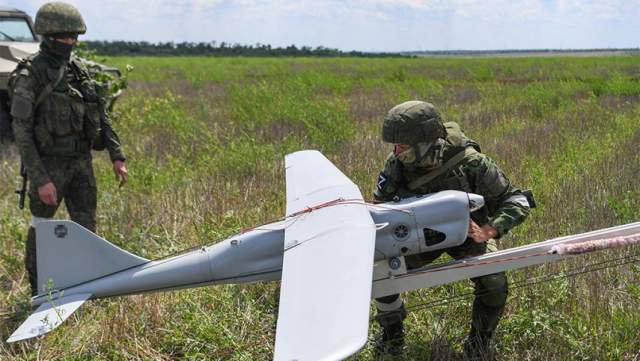
Photo: RIA Novosti
Image source: iz.ru
A few days later, Egorov's battalion-tactical group liberated the settlement from Ukrainian nationalists. Ilya destroyed the militants' firing point he found, forcing them to retreat deep into the settlement, the Defense Ministry said.
From the first days of the special military operation, Lieutenant Colonel Sergey Lyubartsev, in the conditions of systematic fire damage, organizes uninterrupted communication in the interests of the motorized rifle brigade. During the offensive, Ukrainian nationalists opened massive artillery and mortar fire on the positions of the motorized rifle brigade. Sergei skillfully led communications units under enemy fire in an extremely difficult situation. During the battle, he received a concussion, but brought the equipment and subordinates out from under enemy fire.
"The courageous and selfless actions of Lieutenant Colonel Sergei Lyubartsev allowed us to maintain the command of the brigade during the defense, and subsequently go on a counteroffensive and defeat the enemy," the military department noted.
The group of private Grigory Zabegailov was searching for armed formations of nationalists near the liberated settlement. Moving through the area, Grigory discovered Ukrainian artillery positions and immediately handed over their coordinates to the commander, continuing to conduct visual reconnaissance. During artillery strikes on nationalist positions, Private Zabegailov continued to transmit coordinates to adjust the fire, which allowed maximum damage to be inflicted on the enemy.
As a result of the strike, enemy artillery positions, up to seven pieces of equipment and about 30 people were destroyed, the Defense Ministry said.
Anton Lavrov
Andrey Fedorov
